 Petzlover
Petzlover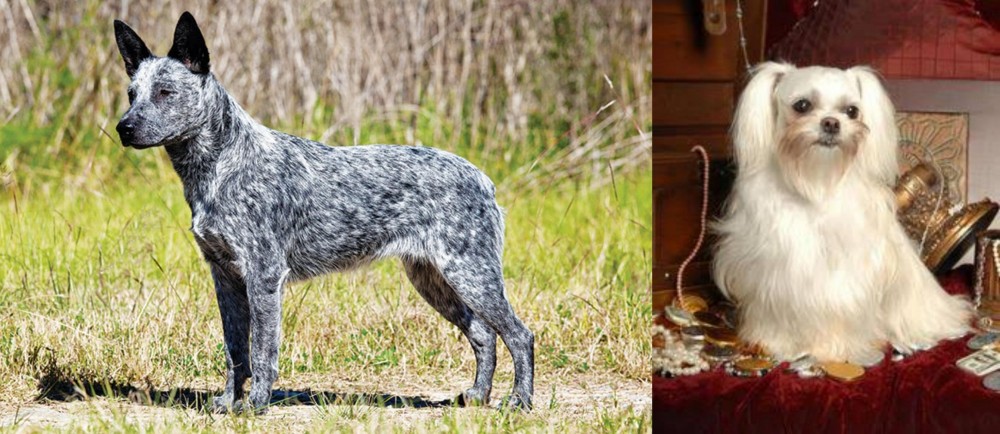 Australian Stumpy Tail Cattle Dog is originated from Australia but Toy Mi-Ki is originated from United States. Australian Stumpy Tail Cattle Dog may grow 21 cm / 9 inches higher than Toy Mi-Ki. Australian Stumpy Tail Cattle Dog may weigh 18 kg / 40 pounds more than Toy Mi-Ki. Both Australian Stumpy Tail Cattle Dog and Toy Mi-Ki has almost same life span. Both Australian Stumpy Tail Cattle Dog and Toy Mi-Ki has almost same litter size. Both Australian Stumpy Tail Cattle Dog and Toy Mi-Ki requires Moderate Maintenance.
Australian Stumpy Tail Cattle Dog is originated from Australia but Toy Mi-Ki is originated from United States. Australian Stumpy Tail Cattle Dog may grow 21 cm / 9 inches higher than Toy Mi-Ki. Australian Stumpy Tail Cattle Dog may weigh 18 kg / 40 pounds more than Toy Mi-Ki. Both Australian Stumpy Tail Cattle Dog and Toy Mi-Ki has almost same life span. Both Australian Stumpy Tail Cattle Dog and Toy Mi-Ki has almost same litter size. Both Australian Stumpy Tail Cattle Dog and Toy Mi-Ki requires Moderate Maintenance.
 There is quite a bit of mystery surrounding the origin of the Stumpy Tail Cattle Dog. The breed was developed as a working dog to herd sheep and cattle, but there are quite a few theories about the development of the breed. It is agreed however, that the dog was developed in Australia and came about from crossing the Australian Dingo and British herding dogs.
There is quite a bit of mystery surrounding the origin of the Stumpy Tail Cattle Dog. The breed was developed as a working dog to herd sheep and cattle, but there are quite a few theories about the development of the breed. It is agreed however, that the dog was developed in Australia and came about from crossing the Australian Dingo and British herding dogs.
Perhaps the most popular theory for the origin of the Australian Stumpy Tail Cattle Dog is that the breed was developed by a man named Timmins, sheep drover and a cattle operating in New South Wales during the colonial period. Whatever the dog’s origins, it was in 1996 that the United Kennel Club, the 2nd largest dog registry in the world and the United States, granted full recognition to the Stumpy Tail Cattle Dog as a member of the Herding Group. The breed’s name was changed to the Australian Stumpy Tail Cattle Dog in 2002. Today he remains almost exclusively a tail-less working dog.
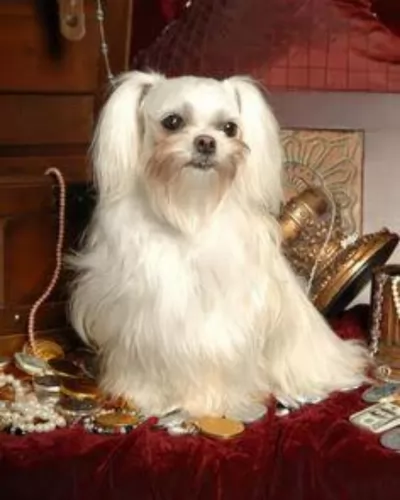 The Toy Mi-Ki is a sociable companion dog. He hasn’t got a long history, and the little bit of history there is, isn’t clear.
The Toy Mi-Ki is a sociable companion dog. He hasn’t got a long history, and the little bit of history there is, isn’t clear.
It is believed that the breed was bought about by Maureen Westburg. It was in the 1980s that she crossed several toy breeds to develop the Mi-Ki. It is thought that she gave the dog the name Mi-Ki because her name was Mikkie. It seems whe wanted a dog that came close to looking like a gremlin.
Some of the dogs used in the breeding program were the Japanese Chin, the Maltese, and the Papillon. The International Miki Registry is trying to get recognition with the United Kennel Club for this dog. There are other canine clubs and organizations that recognize the Mi-Ki Dog as a breed.
 An interesting fact about the Australian Stumpy Tail Cattle Dog is that he is naturally tail-less so no tail docking has been required for this naturally bobtailed dog. He is medium-sized to large-sized with his most distinctive feature being the lack of a tail. The coat of the dog is short to medium length, dense and straight. Another interesting aspect is that the coat color is a speckled blue or speckled red.
An interesting fact about the Australian Stumpy Tail Cattle Dog is that he is naturally tail-less so no tail docking has been required for this naturally bobtailed dog. He is medium-sized to large-sized with his most distinctive feature being the lack of a tail. The coat of the dog is short to medium length, dense and straight. Another interesting aspect is that the coat color is a speckled blue or speckled red.
Height of the dog is 46–51 centimetres at the withers the dog is normally squarely proportioned with long legs and pricked ears. The dog has no exaggerated features and what you see is what you get – a plain, hard-working dog which is fit and muscular. He is equally long from chest to rump as he is from the ground to the shoulder.
The muzzle of the dog is of average length, but fairly broad and the nose is always black. The dog is intelligent, alert and also mischievous and he makes a good pet. With proper socialization, he’ll get on well with children they know and who treat them with kindness. He is alert and makes a very good watchdog, being fairly territorial.
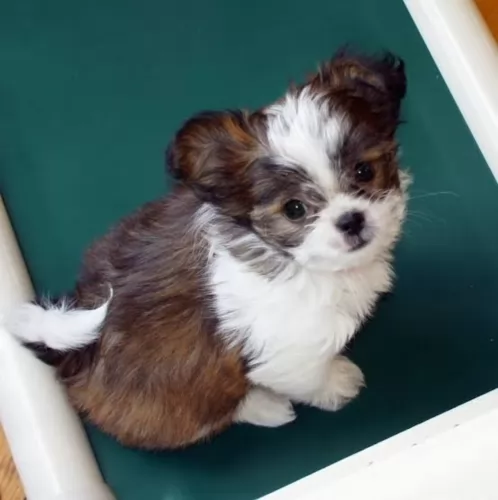 The small Toy Miki stands at between 25 cm – 30 cm in height and weighs between 2 – 5kg. You get two different coat types – long and short and the long-haired variety also has quite a bit of hair around the face.
The small Toy Miki stands at between 25 cm – 30 cm in height and weighs between 2 – 5kg. You get two different coat types – long and short and the long-haired variety also has quite a bit of hair around the face.
His longish coat is low-shedding which makes him popular for people who battle with allergies. The Miki Dog will produce about 2 – 4 puppies.
As a toy dog, he has a domed head with large eyes. Their ears are feathered and are carried erect and the tail is long and feathered.
These little dogs are popular companion dogs and they’re intelligent and loving, making the ideal pet for anyone.
It’s a friendly dog and yet he will bark to alert you of an intruder. Youll take notice because he isn’t the kind of dog that just yaps away.
Children love them and they make great playmates for children who have been taught to be kind and gentle with animals.
Their small size and their adaptable nature make them suitable for city or country living. Sweet and amicable, the social purebred Toy Mi-Ki is everything you want in a companion.
He is loyal and devoted, calm and adaptable. They’re not the kind of dogs to go jogging with you, but nonetheless, he will still need his exercise – walks every day as well as ball games.
 The Australian Stumpy Tail Cattle Dog is a hardy dog, capable of hardships that would take its toll on other dog breeds. He is a wonderful athlete and if you’ve got him working with your livestock, he’ll tirelessly perform his duties – small wonder he is so valued in the Australian cattle industry.
The Australian Stumpy Tail Cattle Dog is a hardy dog, capable of hardships that would take its toll on other dog breeds. He is a wonderful athlete and if you’ve got him working with your livestock, he’ll tirelessly perform his duties – small wonder he is so valued in the Australian cattle industry.
If you’re looking for a robust breed who will have all the energy needed to accompany you on all your adventures, he won’t disappoint. He is amazingly capable and always willing.
He’s a family dog and will be loving, devoted and loyal. Care should be taken with him around small children and other pets as he’s not to comfortable around them and he doesn’t tolerate strangers too well either. Train him and socialize him and you’ll have an amazing friend for life.
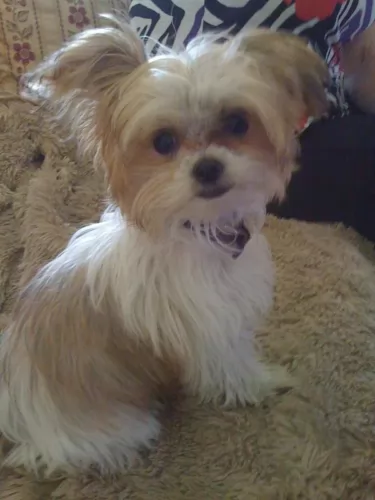 The Mi-Ki is calm and good-natured, and because of his cuteness, he can’t help but become a lap dog, if you allow him.
The Mi-Ki is calm and good-natured, and because of his cuteness, he can’t help but become a lap dog, if you allow him.
He is social and just loves human companionship. He is friendly too and will quite happily be friends with children and pets in the home.
Make sure he is trained and socialized so that you become one of the many people who have nothing but good things to say about this sweet little dog.
 The Australian Stumpy Tail Cattle Dog is regarded as being an extremely healthy breed, and the average life expectancy of this breed is at least 14 to 15 years and older.
The Australian Stumpy Tail Cattle Dog is regarded as being an extremely healthy breed, and the average life expectancy of this breed is at least 14 to 15 years and older.
They don’t suffer with many genetically inherited conditions, but they are susceptible to
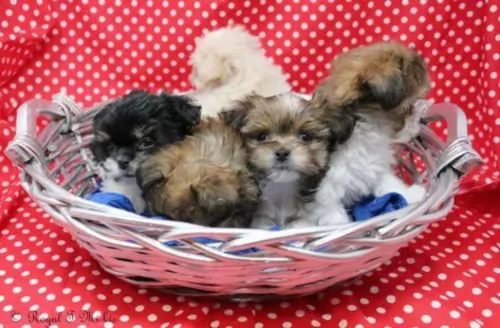 You just have to bear in mind, that because of his short muzzle, he is prone to respiratory problems. Too much exercise and you may find him huffing and puffing. Be careful on a hot day.
You just have to bear in mind, that because of his short muzzle, he is prone to respiratory problems. Too much exercise and you may find him huffing and puffing. Be careful on a hot day.
Also, little dogs like this often have all kinds of dental problems. When you brush him, check his teeth because he can’t tell you if he has a rotten tooth causing him a lot of pain and misery.
Check his eyes too that they are bright and clear and check the inside of his ears. Hypothyroidism and eye issues can also bother the Mi-ki.
 The beauty about the Australian Stumpy Tail Cattle Dog is that he is low to moderate maintenance. He will require a good weekly brushing as he can shed quite a bit when the season’s change and his new coat comes in. He is hypoallergenic.
The beauty about the Australian Stumpy Tail Cattle Dog is that he is low to moderate maintenance. He will require a good weekly brushing as he can shed quite a bit when the season’s change and his new coat comes in. He is hypoallergenic.
Australian Stumpy Tail Cattle Dog puppies will need 4 bowls of food over a 24 hour period Puppies from 6 months on can have 2 bowls a day. Speak to your vet about the best foods for your dog and ensure fresh, cool water is constantly available to your pet.
Don’t just feed your dog pellets continuously – mix in some raw meat and some cooked chicken and rice for variety and to ensure a shiny, glossy coat.
The Stumpy is a hugely energetic dog and he will become bored and frustrated if he doesn’t get plenty of exercise and games. Ball throwing, swimming, long walks and a run in the park will be important for the Stumpy that doesn’t live on a farm. Leaving him alone without exercise will lead to anti-social behaviour such as continuous barking, digging and chewing.
Take your Stumpy to the vet if you suspect health problems. Certainly, when you buy a puppy, make sure that he has all his vaccinations. There are certain health problems that are more common in the Australian Cattle dog and you want to do whatever it takes to ensure your dog steers clear of them.
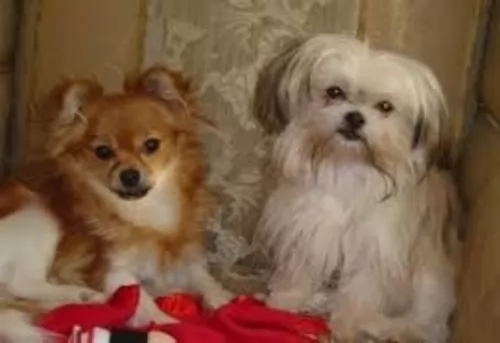 Considered to be low-shedding, the Mi-Ki will benefit from a brush once or twice a week.
Considered to be low-shedding, the Mi-Ki will benefit from a brush once or twice a week.
Some people take their Mi-Ki’s to have their hair professionally cut. This is a good move because then the ears, teeth, and nails are attended to as well.
You can do all of these things at home yourself, but sometimes, particularly with the long-haired Miki, the matting of the hair can make it that you rather send him to professional groomers.
Like all dogs, the Mi-Ki dog will need nutritious food if he is to stay healthy. He isn’t a big eater and you will find the perfect food for your small canine pet.
Read on the packaging to make sure you get high-quality dry food for small dogs. You want the ingredients to be as natural as possible without any toxic colorants and additives.
Meat and protein must always be the top ingredients. Try to provide some home-made food too. Boiled chicken, brown rice, spinach, and sweet potatoes can be chopped up finely and a small portion added occasionally to the dry kibble as a tasty treat.